Overview
The article examines various electronic medical record (EMR) systems that exemplify successful implementations in healthcare, emphasizing their distinctive features and advantages across diverse medical environments. Notable systems such as Epic Systems, Cerner, and Athenahealth illustrate how their functionalities, interoperability, and user engagement tools significantly enhance patient care and operational efficiency. This underscores their essential role in achieving modern healthcare success. By analyzing these systems, we can appreciate the critical impact of effective EMR solutions in advancing healthcare delivery.
Introduction
In the rapidly evolving landscape of healthcare technology, the significance of Electronic Health Records (EHR) and comprehensive data analytics is paramount. As healthcare providers strive to enhance patient outcomes and streamline operations, a diverse array of EHR solutions has emerged, each meticulously tailored to meet the unique needs of various practices.
From the robust capabilities of Epic Systems and Cerner Corporation to the user-friendly interfaces of Meditech and Practice Fusion, these platforms are fundamentally reshaping the way healthcare is delivered. As the shift towards interoperability gains momentum, organizations increasingly recognize the critical role that data insights play in driving strategic growth and improving patient care.
This article delves into the leading EHR solutions available today, highlighting their features, benefits, and the transformative impact they have on healthcare delivery.
CareSet: Comprehensive Medicare Data Insights for Enhanced Patient Care
CareSet stands as a premier provider of comprehensive Medicare data solutions, excelling in the extraction and interpretation of intricate Medicare claims data from over 62 million beneficiaries and 6 million providers. With a thorough analysis of over $1.1 trillion in yearly claims, CareSet equips stakeholders with actionable insights that foster informed decision-making and enhance medical strategies. Their services encompass:
- Identifying new healthcare provider targets
- Analyzing prescribing behaviors
- Charting treatment journeys
All aimed at improving health services and refining healthcare strategies.
Recent trends in Medicare data analysis reveal a significant shift towards Medicare Advantage plans, with 100% of enrollees in Alaska participating in group plans as of 2024. This trend highlights the growing importance of comprehending the complexities of Medicare financing, particularly as elevated payments to Medicare Advantage plans are influenced by risk scores and quality-based star ratings. As noted by Anthony Damico, enrollment information is accessible only for plan-county combinations that include a minimum of 11 beneficiaries, underscoring the challenges in acquiring precise and complete Medicare data.
The impact of Medicare claims data on health outcomes is profound. For instance, beneficiaries in Medicare Advantage incur an average of $2,541 less annually in out-of-pocket costs compared to those in Fee-For-Service Medicare, illustrating the financial advantages of these plans. Moreover, expert opinions stress that enhanced transparency in Medicare data analysis is crucial for improving referral partner relationships and accelerating business development. As Carter Bakkum asserts, ‘Our enhanced transparency provides the tools necessary to accelerate your business development and forge stronger referral partner relationships.’
Case studies exemplify how organizations leveraging CareSet’s Medicare claims data have achieved notable improvements in healthcare. For instance, the case study titled ‘Changes in Medicare Payment Methodology’ illustrates how increased payments to Medicare Advantage plans, driven by risk scores and quality-based star ratings, have spurred the growth of Medicare Advantage spending. By utilizing CareSet’s insights, clients have effectively identified additional targets and optimized treatment analytics, resulting in enhanced market reach and improved outcomes. As the medical landscape evolves, the significance of extensive Medicare data analysis becomes increasingly vital in fostering strategic growth and enhancing treatment.
Epic Systems: Leading EHR Solution for Large Healthcare Organizations
Epic Systems is recognized as a leading provider of electronic medical record systems examples that offer comprehensive EHR solutions specifically designed for large medical organizations. Its platform encompasses a broad range of functionalities, including scheduling, billing, and clinical documentation, all aimed at optimizing workflows and enhancing service quality. A key feature of Epic’s system is its strong emphasis on interoperability, enabling seamless information sharing among medical providers. This capability significantly enhances coordination of services across various environments, ultimately leading to improved outcomes for individuals.
Recent data indicates that the adoption of Epic Systems EHR has surged, with large medical organizations increasingly recognizing its value in enhancing operational efficiency and safety for individuals. For example, the implementation of EHR systems has been linked to a notable reduction in medication errors, attributed to improved accuracy in prescribing and administering medications. This aligns with recent news highlighting that medication errors have diminished due to the enhanced accuracy provided by EHR systems.
Success stories abound, with numerous large healthcare organizations reporting significant advancements in monitoring individuals and compliance with preventive health protocols following the implementation of Epic Systems. These advancements not only decrease readmission rates but also foster a more proactive approach to health management. A case study titled ‘Impact of the EHR Industry on Health Outcomes’ illustrates that the implementation of electronic medical record systems examples has resulted in substantial improvements in various health outcomes, including access to information and preventive care adherence.
As of 2025, Epic Systems continues to dominate the EHR market, holding a substantial share that underscores its effectiveness and reliability. The most recent updates to the platform further enhance its interoperability features, ensuring that providers can access and share essential client information in real-time. Standards such as FHIR and APIs are crucial for achieving interoperability in medical services, and Epic Systems is committed to integrating these standards into its solutions. This dedication to innovation establishes Epic Systems as a leader in the EHR environment, fostering advancements in patient support and operational excellence throughout the medical continuum. As Larry Hodge, President/CEO at HealthTech Resources, emphasizes, building strategic medical relationships is essential for addressing pressing business challenges, further validating the effectiveness of Epic Systems EHR.
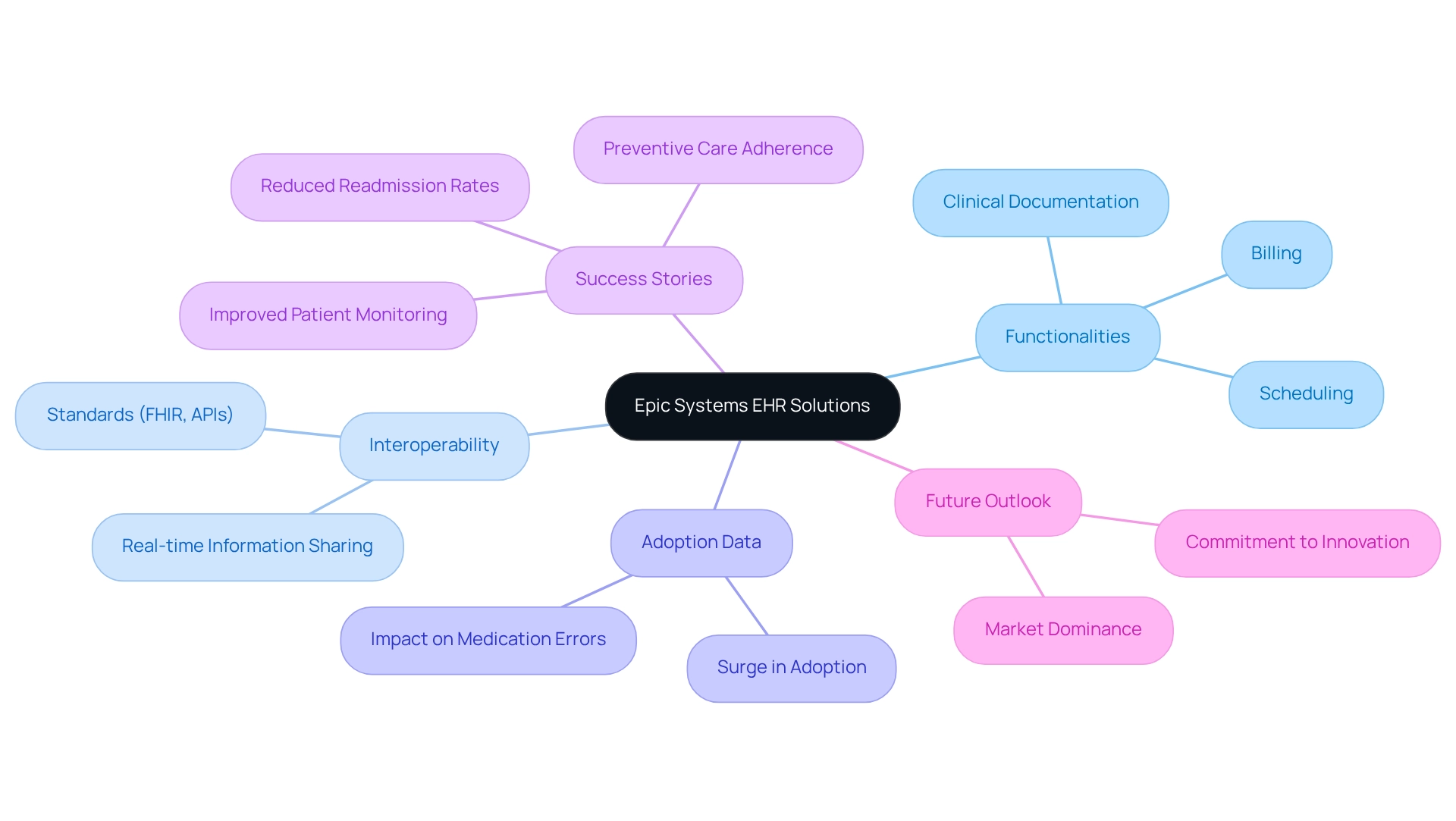
Cerner Corporation: Innovative EHR Solutions for Integrated Care
Cerner Corporation stands at the forefront of EHR innovation, offering electronic medical record systems examples that facilitate integrated care across diverse medical environments. Their platform prioritizes data interoperability, enabling medical providers to seamlessly access and share individual information. This capability is particularly crucial, given that only about 30% of healthcare providers have achieved full EHR interoperability, highlighting the persistent challenges in data exchange.
Cerner’s tools are meticulously designed to enhance clinical workflows, boost individual engagement, and support effective population health management. As a result, these innovations significantly contribute to improved health outcomes, with numerous case studies demonstrating effective applications that have led to enhanced care for individuals. Furthermore, user satisfaction statistics reflect strong endorsement of Cerner’s EHR solutions, underscoring their effectiveness in addressing the needs of medical professionals.
Experts in the field consistently emphasize that advancements in medical technology, including electronic medical record systems examples such as those provided by Cerner, are essential for streamlining workflows and ultimately enhancing patient outcomes. In this context, CareSet’s solutions play a vital role by identifying new medical provider targets and analyzing prescribing behaviors, which are crucial for pharmaceutical market access managers.
CareSet’s innovative data science products, including advanced analytics and real-time insights, enhance drug launch strategies and medical insights, empowering stakeholders with comprehensive Medicare data insights from over 62 million beneficiaries and 6 million providers. The case study ‘PUTTING PATIENTS FIRST’ exemplifies the application of these solutions in real-world scenarios, showcasing their impact on oncology treatment options.
As Robin Leahy, Vice President of Customer Experience, states, ‘Innovation in medical services is key to enhancing outcomes for individuals, streamlining workflows, and…’ This underscores the interconnectedness of electronic medical record systems examples and data analytics in tackling interoperability challenges, as illustrated in the case study titled ‘EHR Interoperability Challenges,’ which stresses the necessity for ongoing efforts to improve data sharing across different electronic medical record systems examples.
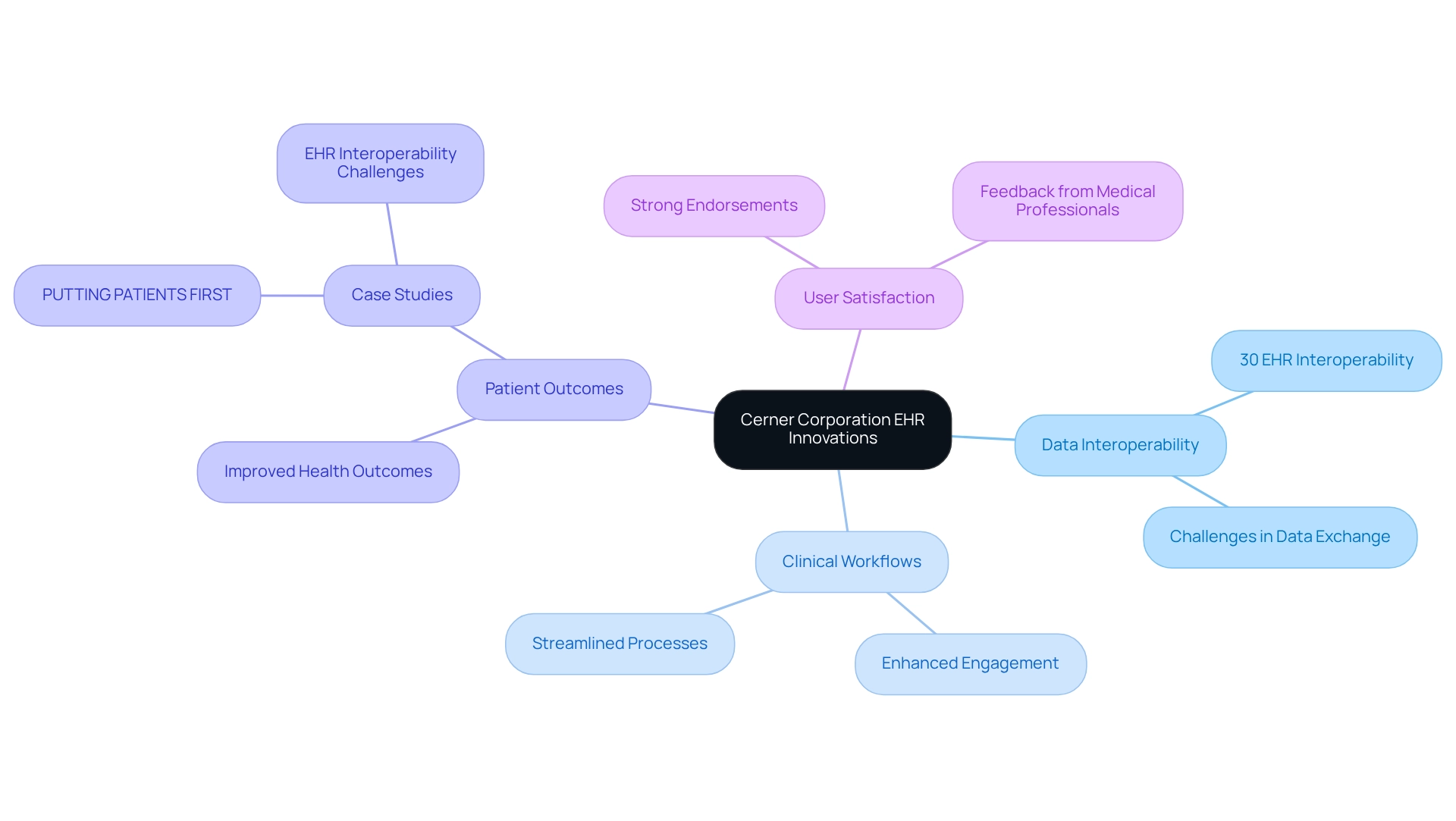
Allscripts: Versatile EHR Solutions for Diverse Healthcare Needs
Allscripts provides a comprehensive suite of electronic medical record systems examples tailored to meet the diverse needs of medical providers, from small practices to expansive health systems. This platform is equipped with essential features for clinical documentation, user engagement, and revenue cycle management, enabling medical professionals to manage their operations efficiently.
A key strength of Allscripts is its commitment to interoperability, which facilitates seamless connections with other medical systems. This capability enhances care coordination, ultimately leading to improved outcomes for individuals. By 2025, Allscripts has made notable strides in interoperability, fostering enhanced data sharing and collaboration among providers.
User testimonials highlight the versatility of Allscripts’ EHR solutions, with many praising the platform’s adaptability to various medical environments. Statistics indicate that practices utilizing Allscripts have experienced substantial improvements in engagement, reflected in rising satisfaction scores and reduced administrative burdens. For instance, electronic medical record systems examples like NextGen Healthcare’s customizable system adhere to HIPAA standards for practices ranging from 1 to over 50 physicians, underscoring the adaptability of EHR systems. Case studies illustrate the effectiveness of Allscripts in real-world applications. For example, AthenaOne by Athenahealth is among the electronic medical record systems examples that provide robust tools for clinical documentation and user engagement, designed to enhance workflow in medical settings. Entities leveraging Allscripts have reported improved operational efficiency and superior management of individual information, contributing to advancements in overall medical delivery.
As the demand for comprehensive EHR solutions continues to grow, Allscripts remains a frontrunner in the market, boasting a notable penetration rate among medical providers. Specialist insights underscore the importance of efficient revenue cycle management across various medical environments, further solidifying Allscripts’ role in enhancing financial performance while improving service quality. Additionally, quotes from SaaSworthy emphasize that Practice Fusion is a unified EHR software that alleviates the administrative workload for independent medical practitioners, illustrating user experiences with EHR solutions.
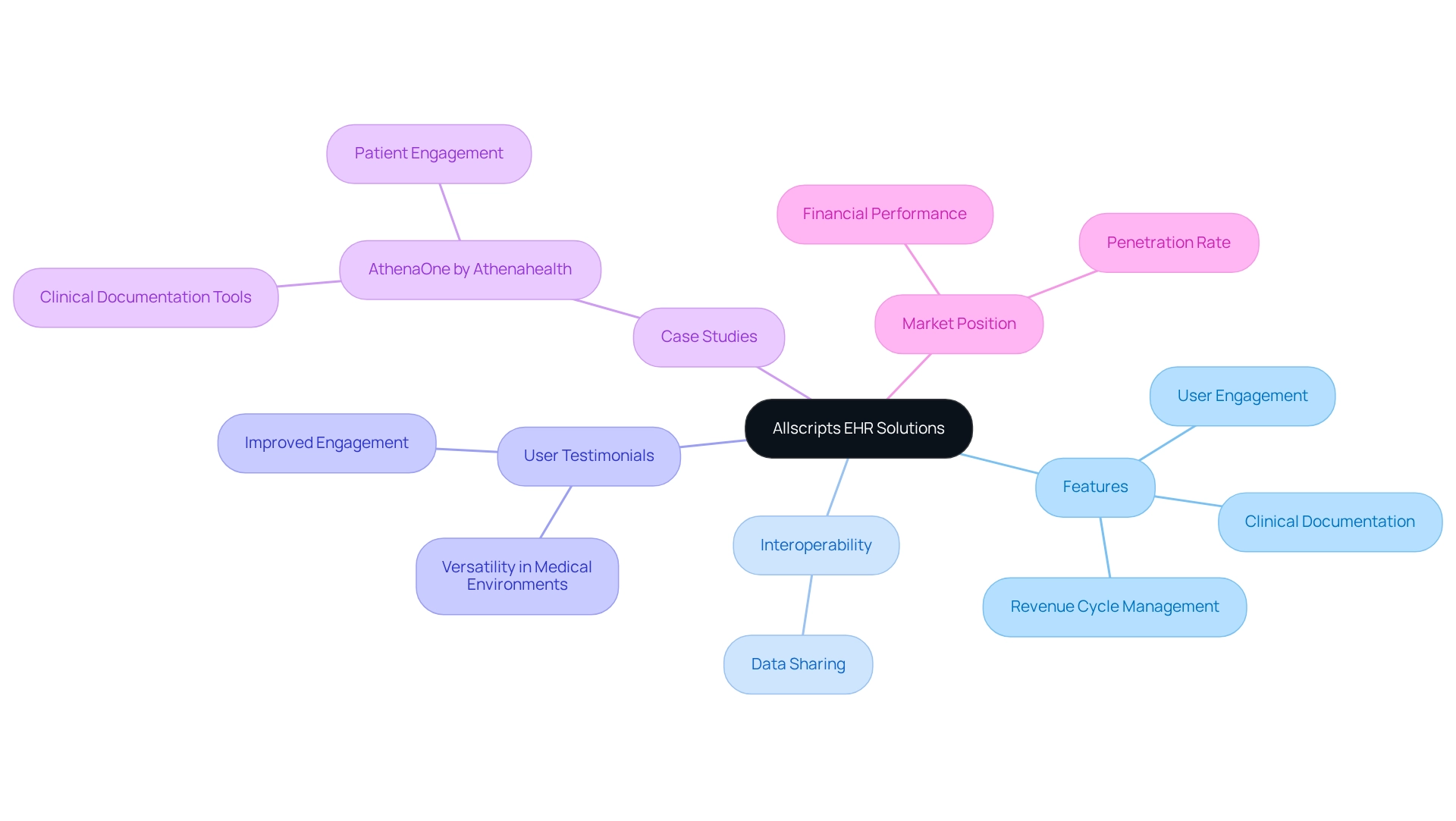
Meditech: User-Friendly EHR Systems for Community Hospitals
Meditech presents user-friendly EHR systems tailored for community hospitals, featuring an intuitive interface that enhances navigation for medical providers. This design significantly minimizes training time, leading to higher adoption rates among staff. Meditech’s solutions are specifically crafted to optimize clinical workflows and boost patient involvement, making them particularly advantageous for smaller medical facilities striving to elevate care delivery.
In 2025, Meditech’s EHR adoption rates in community hospitals have experienced a notable increase, reflecting a growing acknowledgment of the system’s capabilities. Importantly, the Indian Health Service accounted for 0.5% of the ambulatory EHR market, illustrating the competitive landscape in which Meditech operates.
User satisfaction statistics reveal that medical service providers value the streamlined processes and user-friendly features, which contribute to enhanced clinical outcomes. Moreover, Meditech’s EHR systems harness AI and machine learning technologies, aligning with contemporary trends in EHR adoption to bolster efficiency and adaptability in clinical workflows.
Continuous updates to the Meditech interface further enhance usability, ensuring that community hospitals can effectively utilize technology to address their evolving needs. As underscored by industry specialists, the most effective EHRs leverage advanced technologies to support medical providers, and Meditech is poised to meet these expectations.
Athenahealth: Cloud-Based EHR Solutions for Enhanced Practice Management
Athenahealth provides cloud-based EHR solutions that significantly enhance practice management for healthcare providers. The platform features powerful tools for billing, scheduling, and user engagement, all accessible from any internet-enabled device. By emphasizing automation and data analytics, Athenahealth empowers practices to optimize operations and improve patient services. In 2025, user growth for Athenahealth’s EHR system has surged, reflecting its rising popularity among modern healthcare providers.
Recent updates to Athenahealth’s practice management features have further streamlined workflows, enabling real-time claims scrubbing and billing rule updates through the athenaOne Network, which encompasses over 160,000 healthcare providers. This shared data not only enhances claims processing accuracy but also offers valuable benchmarks for practices to evaluate their performance against peers. Notably, if Athenahealth fails to manage 95% of denials within 10 business days of a rejection notice, the company refunds 2% of the monthly invoice’s value, underscoring its commitment to efficient billing processes.
User testimonials underscore the platform’s effectiveness, with one user highlighting the ease of accessing quality measure performance and identifying care gaps. However, it is crucial to note that the software may not be suitable for those seeking an easy-to-use solution or those who prefer not to retain a medical coder on staff, which could present limitations for certain practices. Such insights empower providers to enhance their service delivery and patient outcomes. Overall, Athenahealth’s cloud-based EHR solutions are among the electronic medical record systems examples that are instrumental in driving practice management improvements, positioning them as a vital asset for medical organizations striving for operational excellence. Furthermore, CareSet’s dedication to unlocking Medicare data enhances healthcare providers’ engagement strategies, particularly in oncology treatment options like Qinlock for Gastrointestinal Stromal Tumor (GIST). This synergy between Athenahealth’s EHR capabilities and CareSet’s data leadership highlights the importance of comprehensive data analytics in improving care for individuals.
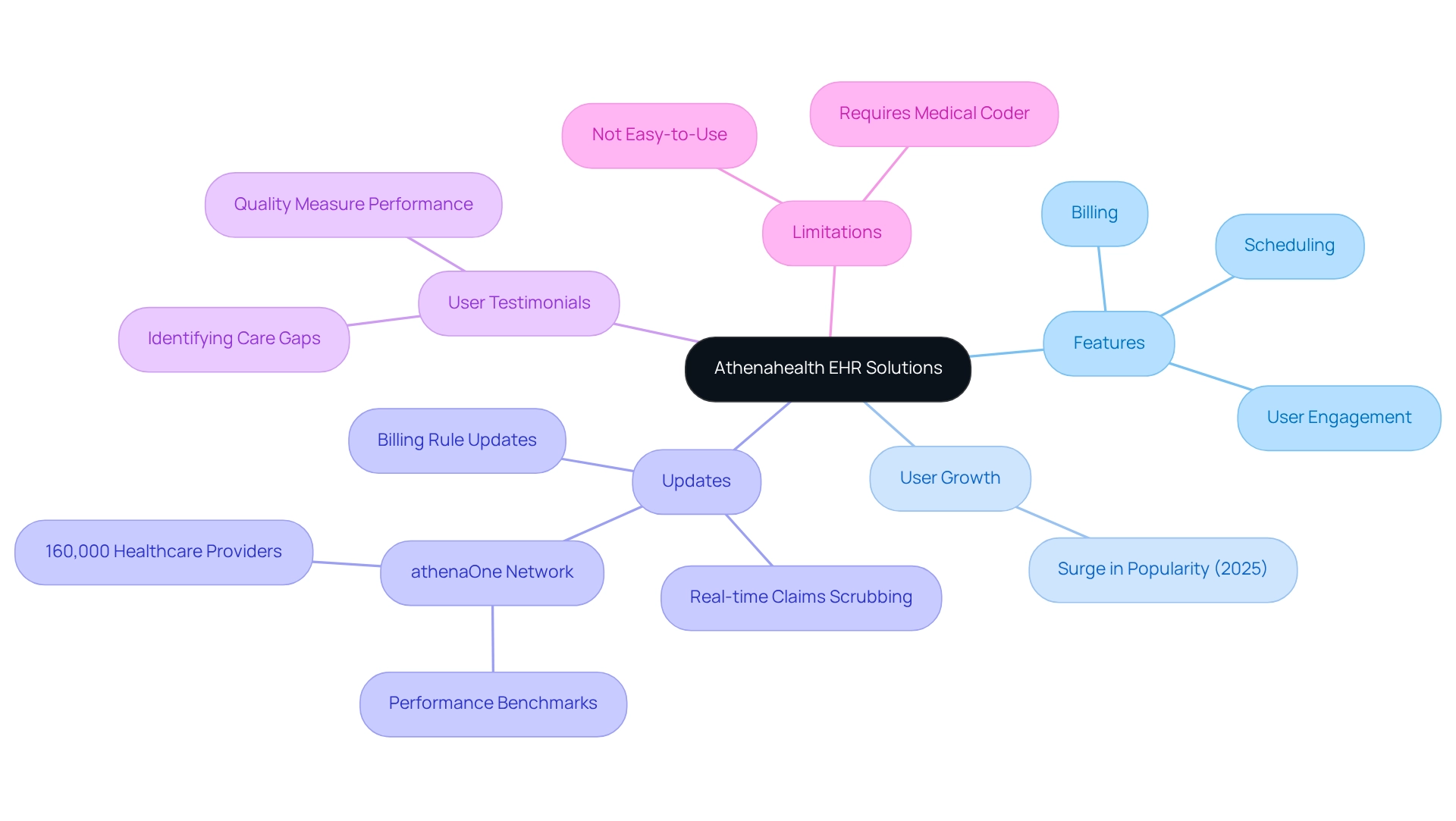
eClinicalWorks: Interoperable EHR Solutions for Patient Engagement
eClinicalWorks provides a comprehensive suite of interoperable EHR solutions designed to significantly enhance engagement with individuals receiving care. This platform features secure messaging, appointment scheduling, and accessible user portals, empowering individuals to effortlessly access their health information. Such a commitment to interoperability facilitates seamless data exchange among healthcare providers, which is vital for improving service coordination and boosting satisfaction among individuals.
Recent updates in 2025 highlight eClinicalWorks’ advancements in engagement tools, showcasing how these innovations contribute to enhanced healthcare experiences. Notably, the integration of healow Payment Services™ has optimized the payment process, with more than $200 million in client payments processed monthly. This efficiency not only simplifies transactions but also underscores a commitment to enhancing the overall experience for individuals, as financial interactions play a critical role in their perception of treatment.
Case studies further illustrate the effectiveness of eClinicalWorks in enhancing engagement. A prominent example is healow’s EHR-agnostic platform, which automates data exchange between health plans and providers, resulting in improved quality measures and superior medical outcomes. This interoperability fosters a more integrated medical environment, directly impacting individual satisfaction by ensuring that assistance is timely and well-coordinated. Medical professionals emphasize the importance of these interoperable solutions, noting their essential role in addressing the evolving needs of those receiving treatment. As James Merlino articulates, focusing on client experience is crucial for organizational success in today’s competitive landscape. Furthermore, as Theodore Roosevelt famously stated, ‘No matter how skilled a medical professional is, the individual’s perception of treatment often relies on the compassion and understanding they receive.’ By prioritizing interoperability and compassionate support, eClinicalWorks positions itself as a leader in enhancing engagement and satisfaction across the healthcare continuum.
NextGen Healthcare: Tailored EHR Solutions for Specialty Practices
NextGen Healthcare offers tailored electronic medical record systems examples specifically designed for specialty practices, effectively addressing the unique workflows and requirements inherent to various medical fields. By focusing on integrated health IT solutions, NextGen enhances both clinical efficiency and care for individuals, empowering providers to adeptly manage clinical and financial operations.
Recent statistics reveal that the adoption of NextGen Healthcare EHR systems in specialty practices has significantly enhanced operational workflows. Many users report improved client engagement and streamlined processes. According to CareSet, which consolidates over 100 external data sources for comprehensive insights, practices utilizing customized EHR solutions have observed a notable increase in efficiency and satisfaction among individuals. A particularly telling case study on oncology treatment options illustrates how leveraging Medicare data enables healthcare providers to interact more effectively with individuals, especially regarding late-stage treatment alternatives such as Qinlock for Gastrointestinal Stromal Tumor (GIST).
Users commend the platform for its adaptability, emphasizing that it allows for customization to meet the specific needs of their specialty, a crucial factor in maintaining high standards of care. As noted by Forbes Advisor, “Practice Fusion is a top EHR software offering the key features practitioners need,” underscoring the significance of tailored solutions in enhancing clinical outcomes.
In 2025, NextGen Healthcare persists in its innovation, introducing updates that further bolster specialty practices. These updates feature advanced analytics tools that provide insights into outcomes and treatment effectiveness, enabling providers to make data-driven decisions. Success narratives from various specialty practices highlight how electronic medical record systems examples have led to measurable improvements in clinical efficiency, with practices reporting reduced administrative burdens and increased client satisfaction.
NextGen’s dedication to supporting specialty practices is evident in its ongoing development of features tailored to the distinct needs of these providers. By integrating comprehensive data management capabilities, NextGen ensures that healthcare professionals can concentrate on delivering quality care while efficiently navigating the complexities of their practice environments. This strategic approach not only enhances outcomes for individuals but also fosters long-term growth and sustainability for specialty practices.
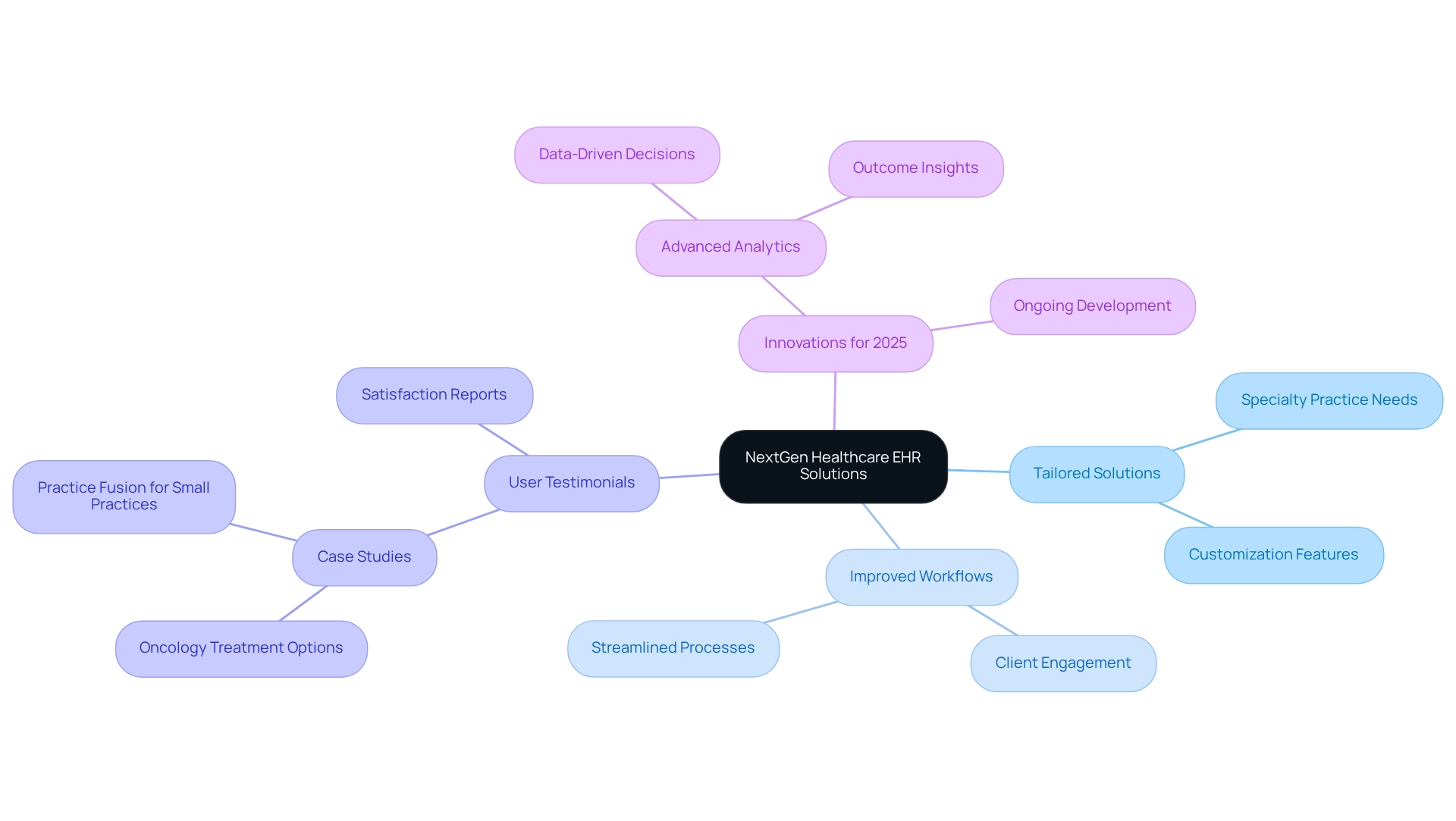
Practice Fusion: Free EHR Platform for Small Practices
Practice Fusion offers a complimentary EHR platform specifically designed for small medical practices, providing a cloud-based solution that includes essential features such as charting, e-prescribing, and appointment scheduling. This no-cost model significantly lowers the financial barriers associated with EHR adoption, enabling small practices to implement advanced technology without incurring additional expenses.
The platform’s intuitive interface and comprehensive functionalities enhance operational efficiency, allowing practices to optimize workflows and improve care delivery. For example, practices utilizing Practice Fusion have reported significant enhancements in their operational processes, including reduced appointment scheduling times and improved engagement through more effective follow-up communication. A case study on the client check-out process illustrates this improvement, where receptionists efficiently collect payments and schedule follow-up visits, integrating seamlessly with the practice management system. This integration ensures that individuals receive a complete overview of their visit, encompassing follow-up appointments and educational resources, thereby fostering engagement and continuity of treatment.
In 2025, updates to the Practice Fusion platform have further refined its capabilities, ensuring that small practices can harness the latest technological advancements without the burden of high costs. Statistics reveal a growing trend in EHR adoption among small practices, with many owners expressing satisfaction with the operational efficiencies achieved through Practice Fusion. This trend underscores the platform’s pivotal role in transforming how small practices manage client information and care processes, ultimately leading to improved outcomes and enhanced satisfaction. As noted by Giles Bruce, ‘Cambridge-based OhioHealth Southeastern Medical Center launched an Epic EHR as part of a significant investment in improving their medical services, which serves as one of the electronic medical record systems examples that emphasize the importance of adopting effective EHR systems in today’s medical environment.

Greenway Health: Integrated EHR Solutions for Improved Patient Outcomes
Greenway Health offers electronic medical record systems examples that provide integrated EHR solutions, markedly enhancing outcomes through a comprehensive platform combining clinical documentation, practice management, and engagement tools. This integration optimizes workflows, enabling medical providers to deliver care that is both efficient and effective. In 2025, Greenway Health reported significant improvements in outcomes, a testament to their innovative approach and commitment to leveraging advanced technologies tailored to meet the evolving needs of individuals.
User satisfaction statistics indicate that healthcare professionals frequently cite familiarity with the EHR system as a crucial factor for success. This highlights the importance of training and experience in effectively utilizing EHRs. The case study titled ‘Experience with EHR as a Success Factor’ illustrates that familiarity with the specific EHR system is consistently recognized as a top success factor among providers, nurses, and clinicians, reinforcing the significance of user familiarity.
Expert opinions underscore the transformative potential of EHR technology in enhancing patient outcomes. Ceci Connolly noted the increasing willingness of doctors to utilize patient-generated information, signaling a shift towards more individualized treatment. Industry leaders emphasize that integrating such data into clinical workflows is becoming increasingly essential. CareSet’s case study on oncology treatment choices exemplifies how accessing Medicare data can empower medical providers to engage more effectively with treatment options, such as Qinlock for Gastrointestinal Stromal Tumor (GIST). This data leadership positions CareSet as a pivotal player in enhancing provider engagement and optimizing individual well-being.
Greenway Health’s dedication to innovation and operational excellence solidifies its status as a leader in the healthcare technology sector, ensuring clients can navigate the complexities of healthcare while achieving optimal results. Pratap Sarker, CEO of Greenway Health, remarked, ‘Our Greenway team is committed to providing quality solutions and operational excellence to our clients, and these awards emphasize the dedication and passion our team possesses to ensure the success of our clients and enhance outcomes through technology.’
Furthermore, OhioHealth’s use of a data-driven approach to optimize operating room capacity exemplifies how electronic medical record systems examples can elevate operational efficiency and patient care.
Conclusion
The exploration of leading Electronic Health Record (EHR) solutions reveals a transformative landscape in healthcare delivery. CareSet’s comprehensive Medicare data insights and Epic Systems’ robust functionalities for large organizations exemplify how each platform plays a pivotal role in enhancing patient care and operational efficiency. Cerner Corporation and Allscripts further illustrate innovation in integrated care and versatile solutions tailored to diverse healthcare needs.
As organizations increasingly adopt these EHR systems, the benefits become evident:
- improved care coordination
- reduced medication errors
- enhanced patient engagement
The shift towards interoperability across platforms underscores the importance of seamless data exchange, critical for achieving optimal health outcomes. Success stories highlighted throughout this article demonstrate how healthcare providers leveraging these technologies can significantly improve patient experiences and streamline clinical workflows.
In conclusion, the ongoing evolution of EHR solutions transcends mere technology; it fundamentally aims at improving patient care and empowering healthcare providers. As the healthcare landscape continues to advance, integrating comprehensive data analytics and innovative EHR systems will be crucial in addressing today’s healthcare challenges. Embracing these solutions can lead to better health outcomes, increased patient satisfaction, and a more efficient healthcare system overall.


